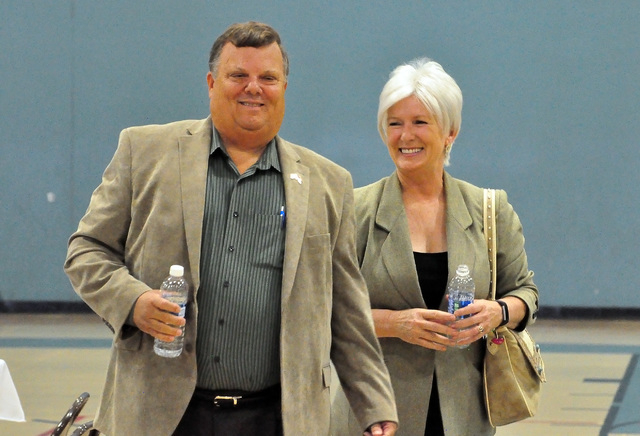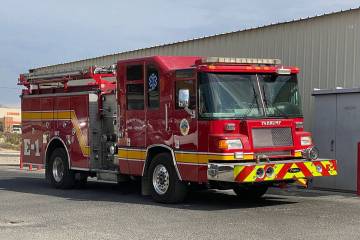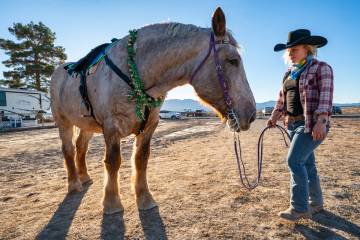Wichman, Mattox debate the issues facing northern Nye County
In the Nye County District I debate last Friday, incumbent Commissioner Lorinda Wichman sought to fend off her main opponent, Scott Mattox of Amargosa Valley.
In the hour debate at Rosemary Clarke Middle School, the two Republicans touched on some of the issues that prevail in the sparsely-populated District I that covers predominantly rural parts of the county and the northern portion of Pahrump from Bell Vista Road. Among the issues were the county’s relationship with the BLM, the lack of jobs, abatement and water rights.
Mattox said he wants to get involved in the political process, while Wichman, who is nearing her second term, said that she “isn’t done yet.”
“I’m not for term limits,” Wichman said.
When asked about the role of county commissioners in the northern part of the county, Mattox said: “Our needs in rural communities are not being met.”
He added that county commissioners “are county commissioners, not district commissioners.”
“They are a county commissioner, and they need to address the needs of the entire county,” he said.
Mattox said the big challenge that rural parts of the county face is jobs, whereas Wichman said the only place that has an unemployment problem in Nye County is Pahrump. Tonopah doesn’t have enough available housing to accommodate its existing workforce, while other towns in the county have large concentrations of retirees, she said.
The two candidates agreed that roads were “one of the most pressing issues” in the county.
Wichman and Mattox however were on two opposite sides when they talked about the recent 5-cent gas tax increase.
Wichman stood by her vote for the five-cent gas tax increase.
“The gas tax is strictly for roads,” she said.
“I’m categorically opposed to new taxes,” Mattox said.
Mattox also said that the county needs to bring more jobs to address the budget issue. Wichman meanwhile, attributed the problem to property taxes. She said that she intends to encourage the Nevada Legislature not to give tax abatement to large companies that come in.
If elected, Mattox said the county’s budget will get the most attention from him.
Mattox said about abatement: “The county commissioners should get involved if the issue involves the health and the safety of others.”
Wichman said that officials should determine the difference between public and private nuisance. If there’s a safety issue, officials should follow it “as the public nuisance rather than private nuisance for the safety of the public.”
Speaking about the BLM and other government agencies that have a heavy presence in Nye County, where the federal government controls 92 percent of the land, Wichman said it’s “absolutely essential” that as a commissioner you establish a personal relationship with government agencies.
Mattox spoke about some of the difficulties when dealing with government agencies.
“The problem with that metric we have in a lot of these cases is that the people that you have to deal with, especially at the federal or at the state level, think that in a hierarchy of things, that they are more powerful,” he said.
Both agreed that the county and towns within Nye need to be proactive when it comes to preparing for Interstate 11, which is planned to follow U.S. Highway 95 north.
The three Republican candidates, Wichman, Mattox and Pahrump resident Alex Jones are in June 14 primary for the seat. The primary winner will take the seat because no one from another party registered to run.
District I Commission precincts are in Beatty, Currant Creek, Duckwater, Gabbs, Ione, Amargosa Valley, Manhattan, Mercury, Round Mountain, Sunnyside, Tonopah, Pahrump, Smoky Valley and Forty Bar.
Contact reporter Daria Sokolova at dsokolova@pvtimes.com. On Twitter: @dariasokolova77

















